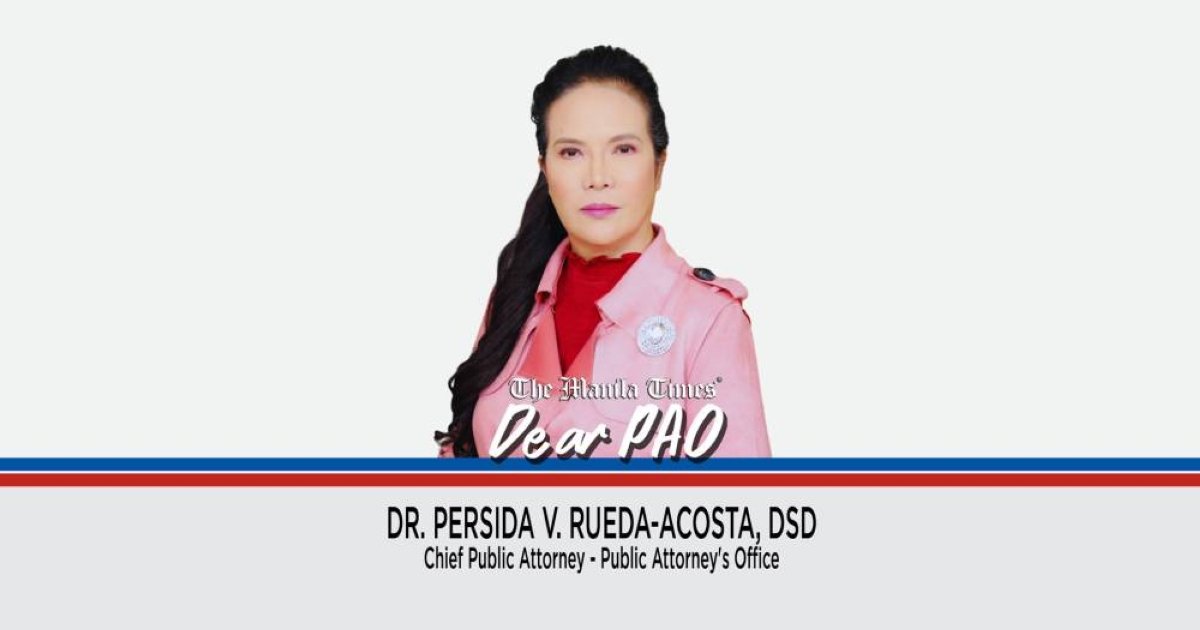Dear PAO,
Paolo convinced me to marry him, and our marriage took place in 2016. After two years of marriage, Kristine appeared and claimed she was legally married to Paolo. I was really shocked and could not forgive Paolo for deceiving me. I would like to file a case for bigamy against him, but Kristine mentioned that I am likewise liable for the said crime. She added that the said offense cannot be committed by Paolo alone as bigamy is similar to the crime of concubinage where, as they say, it takes two to tango. Am I really liable for the crime of bigamy?
Shiela
Dear Shiela,

Bigamy is a crime punishable under Article 349 of the Revised Penal Code of the Philippines:
“The penalty of prision mayor shall be imposed upon any person who shall contract a second or subsequent marriage before the former marriage has been legally dissolved, or before the absent spouse has been declared presumptively dead by means of a judgment rendered in the proper proceedings.”
To guide you further, the elements of bigamy were enumerated in Lasanas v. People of the Philippines, GR 159031, June 23, 2014, where the Supreme Court, through Chief Justice Lucas Bersamin, said:
“The elements of the crime of bigamy are as follows: (1) that the offender has been legally married; (2) that the marriage has not been legally dissolved or, in case his or her spouse is absent, the absent spouse could not yet be presumed dead according to the Civil Code; (3) that he or she contracts a second or subsequent marriage; and (4) that the second or subsequent marriage has all the essential requisites for validity.
Given the foregoing, Paolo may be held liable for bigamy since the aforecited elements of the crime are present. Yet, bigamy does not always entail the joint liability of two individuals. As pronounced by the Supreme Court, through Associate Justice Salvador Esguerra, in the case of People of the Philippines v. Nepomuceno, Jr., GR L-40624, June 27, 1975:
“Appellant’s contention that the crime of bigamy entails the joint liability of two persons who marry each other, while the previous marriage of one or the other is valid and subsisting is completely devoid of merit. Even a cursory scrutiny of Art. 349 of the Revised Penal Code will disclose that the crime of bigamy can be committed by one person who contracts a subsequent marriage while the former marriage is valid and subsisting. Bigamy is not similar to the crimes of adultery and concubinage, wherein the law (Art. 344, first and third pars., Revised Penal Code, and Sec. 4, Rule 110, Rules of Court) specifically requires that the culprits, if both are alive, should he prosecuted or included in the information. In the crime of bigamy, both the first and second spouses may be the offended parties depending on the circumstances, as when the second spouse married the accused without being aware of his previous marriage. Only if the second spouse had knowledge of the previous undissolved marriage of the accused could she be included in the information as a co-accused. Bigamy is a public offense and a crime against status, while adultery and concubinage are private offenses and are crimes against chastity. In adultery and concubinage, pardon by the offended party will bar the prosecution of the case, which is not so in bigamy. It is, therefore, clear that bigamy is not similar to adultery or concubinage.” (Emphasis ours)
Thus, the offended party in the crime of bigamy may be the first or second spouse. The second spouse is an offended party if he or she has no knowledge of the previous undissolved marriage. Conversely, the second spouse can only be included in the information or complaint as co-accused in the crime of Bigamy if he or she had knowledge of the previous undissolved marriage at the time of their subsequent marriage. Bigamy cannot be compared with Adultery or Concubinage because the latter are private offenses and classified as crimes against chastity, while the former is a public offense and is a crime against status.
Applying the above cited law and jurisprudence to your situation, it is not true that you are deemed a co-accused of Paolo should a bigamy case be filed in court. You can only be impleaded as co-accused if you had knowledge of Paolo’s previous subsisting marriage when you married him, which appears not to be the case given that you were shocked when you learned about his previous marriage to Kristine only after your marriage. Hence, you are also a victim of Paolo.
We hope that we were able to answer your queries. This advice is based solely on the facts you have narrated and our appreciation of the same. Our opinion may vary when other facts are changed or elaborated on.
Editor’s note: Dear PAO is a daily column of the Public Attorney’s Office. Questions for Chief Acosta may be sent to [email protected]










